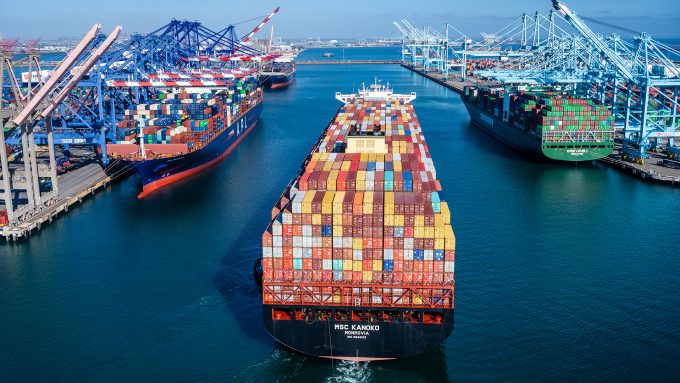With negotiations on the US West Coast set to begin next week, the Pacific Maritime Association (PMA) is positioning itself as modernists held back by luddites, while the union, in an open letter, has appealed to Americans to back dockers against foreign plunderers.
In the letter, International Longshore and Warehouse Union (ILWU) president Willie Adams espoused the value of his 22,000 members, frontline workers that kept US commerce working throughout the pandemic.
Mr Adams said that as the pandemic progressed, union members experienced the same fears and “devastating losses” as the rest of the country.
Even as the country went into lockdown, ILWU dockers “continued to work – moving cargo at ports from San Diego, California to Bellingham, Washington, to ensure our store shelves remained stocked, PPE was accessible, and hospitals supplied,” wrote Mr Adams.
According to the union it was these same dock workers that ensured record numbers of containers were moved through the ports as demand rebounded. The union claimed: “The ILWU takes great pride in the fact that 2021 delivered the movement of more than 26 million containers (TEUs) along the West Coast and marked the largest volume of cargo ever moved through the Ports of Los Angeles and Long Beach in a single year.”
But the union leader could not resist taking a dig at the foreign “billion dollar” shipping lines that lease most of the terminals at US West Coast ports. He claimed they had “gouged American businesses by charging them ten times the usual shipping rates and have contributed toward the rise in inflation”.
Moreover, these same foreign carriers sought to use machines to move cargo rather than American workers, robots that not only “kill” jobs but threaten security.
“In addition to a loss of jobs, automation poses a great national security risk as it places our ports at risk of being hacked as other automated ports have experienced. These attempts should be a concern for our nation as the intention behind them isn’t what’s best for America, but rather what’s best for foreign profits,” writes Mr Adams.
A union spokewoman clarified these remarks, pointing to the hacking of the Port of Durban in South Africa in 2021 and the 2017 NotPetya attack on Maersk systems, including its terminals.
Moreover, the ILWU said that documents such as the 2021 International Transport Forum report showed how automated terminals “are actually less efficient in the movement of goods than those operated in a traditional manner.”
The union also rejected the idea that automated terminals offer safer working spaces, arguing that “automation doesn’t equate to safer working conditions at the ports, it means a loss of good jobs at the ports.”
For its part, the PMA, the employers’ organisation that represents the terminal operators on the West Coast, has fired its own pre-negotiation salvo claiming that automation is the key to more efficient and sustainable growth at the ports.
Commissioned by the PMA the study was conducted by Dr. Michael Nacht, Professor of Public Policy at the University of California, Berkeley, and former Assistant Secretary of Defense, and Larry Henry, Founder of ContainerTrac, Inc.
The PMA study raised concerns that congestion and delays at the ports of Los Angeles, which handle 40% of US imports from Asia, will see freight shifting to East Coast terminals.
Studying two automated terminals at the Ports of Los Angeles and Long Beach the report says that automated terminals process cargo faster, with some 44% greater throughput per acre than non-automated terminals.
In addition, due to growth. more jobs, with higher skillsets were required at the automated ports to handle the increased volumes between 2015 and 2021.
According to the PMA study: “Paid ILWU hours at the two automated terminals rose 31.5%, more than twice the 13.9% growth in paid hours at the non-automated terminals.”
“Registered ILWU workforce in Los Angeles and Long Beach grew 11.2%, compared to 8.4% for the other 27 West Coast ports.”
Automation brings health benefits to workers as well as the local communities that live and work in and around the ports, by reducing emissions through using electrified equipment and offering rapid turn around times for diesel powered trucks.
“Automation is a global trend and the hallmark of the world’s most advanced ports,” concluded the PMA report.
In a recent press conference James McKenna, PMA president and CEO reportedly said that automation was a key tool in managing larger volumes at terminals. However, Mr McKenna was also confident a deal would be agreed as the pandemic had meant greater co-operation between employers and union staff.
Mr McKenna added: ““Really working together at overcoming the (pandemic) obstacles I’ve already talked about has solidified our ability to come together.”
Nevertheless, he said that the old-fashioned wages, working conditions and hours would be the “challenging issues” that the negotiators would need to tackle.
This year’s contract negotiations may have the air of modernity versus the sterile stagnation of yester-year. But in reality, both sides understand that the other side needs to protect its membership.
IF the negotiations are to be successful following, what has been a pandemic of biblical proportions, both sides need to show that they are able to achieve a very creditable compromise.






